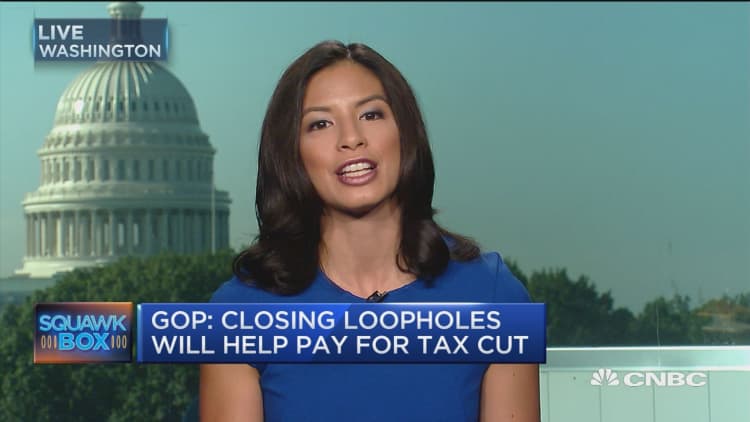
In the messy fight over tax reform, all sides can agree on one point: The U.S. tax system is way too complicated.
That's why Republicans are calling for a massive rewrite that would simplify the code.
The White House has proposed doing that by closing almost all of the roughly 200 loopholes that riddle the system. These special carve-outs are worth an estimated $18.4 trillion over the next decade — money that the GOP wants to use to pay for across-the-board tax cuts instead.
But getting rid of what are technically known as tax expenditures is politically perilous. Many of them are in existence because they are backed by vocal constituencies willing to fight for them. We're not just talking about the big-money corporate lobbyists that lawmakers love to profess to hate. The laundry list of loopholes also includes breaks for student loans, foster care, even railroad worker retirement plans.
"You won't get rid of all of them. You just won't get it," said Republican former Rep. Tom Davis, now director of federal government affairs at Deloitte. "None of them are easy, or else they would have been done already."
In fact, the lion's share of loopholes is enjoyed by households, not corporations. The Tax Foundation estimates that tax expenditures in the individual code are worth $15.6 trillion over the next decade compared with $2.7 trillion for business loopholes.
The largest individual expenditure is related to health care. Many businesses pay for part of their employees' insurance premiums, but workers don't have to count that as income for tax purposes. The so-called health-care exclusion amounts to $2.9 trillion in lost federal revenue over a decade, according to the Tax Foundation.
Two of the top five individual breaks focus on housing, including the popular mortgage interest deduction, which the group puts at $895 billion. Retirement benefits and the tax treatment of capital gains are also among the biggies.
On the corporate side, the primary loophole is the ability of multinational companies to defer taxes on income that's stashed outside the country. That represents about $1.3 trillion in federal revenue, according to the foundation. Business can also write off the cost of certain capital investments more quickly, a $164 billion benefit. There's also an incentive for companies to manufacture in the United States that's worth about $152 billion.
There is heated debate over what a loophole, or tax expenditure, actually is. For example, homeowners who rent their property must pay taxes on that income. But homeowners who live in their property aren't taxed on the "rental income" they are effectively paying to themselves. And that counts as a massive tax benefit that the Tax Foundation values at $1.2 trillion.
If it sounds confusing, don't worry — it is. Most people probably don't consider the benefit of living in your own home as a tax loophole. It's just common sense.
Amir El-Sibaie, the Tax Foundation analyst who compiled the data, put it this way: "The particular nature of what constitutes a tax expenditure in Washington is partially economics, partially one's value judgments, and partially historical accident."


